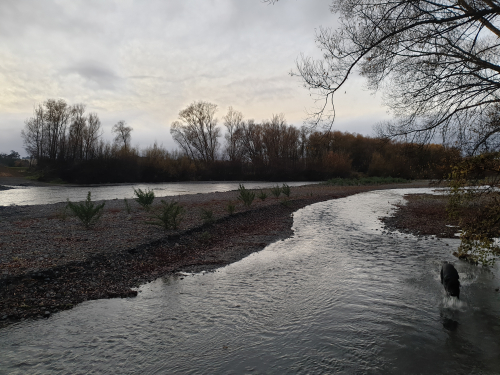
Current filter:

After several years of dry summers, many have welcomed the recent wet spring. However, Hawke’s Bay is still working through how it manages the impacts of climate change over the long term.
Hawke’s Bay Regional Council plays a key role in building our region’s resilience to the impacts of climate change on our natural resources. And, as part of the Regional Water Security Programme (RWSP), Council is progressing a three-year trial to test whether Managed Aquifer Recharge (MAR) could be another tool for securing freshwater supplies.
The RWSP team has been working with landowners to secure access to a site near Central Hawke’s Bay’s Waipawa river for a MAR trial and is currently applying for consent to carry it out.
If consented, when water levels are high in winter, water would be piped from gravel under the river and gravity-fed across two farms to a third, where it would be filter through a constructed wetland.
Regional Water Security Programme director, Tom Skerman says water would then soak through a series of ‘leaky ponds’ into the shallow aquifer – essentially mimicking how aquifers are naturally recharged.
“What we expect to see is the water table increasing and remaining high enough to protect the eco-systems of downstream waterways, even during the dry summers or droughts.
Traditionally, the deeper aquifer is where most of Central Hawke’s Bay’s water is drawn from.
“The second part of the trial is to test pumping the naturally filtered water into the deeper aquifer during the winter months when river levels are high. In summer, we’ll trial recovering some of that stored water,” Mr Skerman says.
In partnership with local farmers, the recovered water will be used for a sustainable land use trial to demonstrate new water conservation, cropping and land use practices.
The MAR trial is proposing to divert approximately 3 million m3 per year from the Waipawa river, which sits in the Tukituki catchment, when it is running at its peak in winter.
Mr Skerman says the Tukituki river has been identified as one of New Zealand’s most vulnerable to climate change impacts – an example of the global conflict between the supply of freshwater reducing and the pressure on water supply increasing.
“While water consents from rivers and aquifers in Hawke’s Bay have been capped, we still need to build our resilience to climate change by working hard to supplement supply and reduce demand.
“MAR has the potential to make an important contribution to increasing water security in this area and alleviate pressure on Central Hawke’s Bay’s main aquifer and waterways. If the trial is successful, a network of MAR sites could be strategically located to replenish groundwater,” Mr Skerman says.
Council has been engaging with mana whenua on the MAR trial since late last year to ensure any cultural impacts are identified. Hui are being held later this month with marae located near the site to discuss a cultural impact assessment and the potential for a cultural monitoring programme.
Similar MAR trials have been carried out successfully in Canterbury and Tairāwhiti in recent years, however more than 1000 MAR schemes have been successfully constructed in dry countries around the world over the last 60 years.
The trial project is being financially supported by Central Government’s regional economic development organisation Kānoa – RDU, which manages the Provincial Growth Fund.
18 November 2021
Disclaimers and Copyright
While every endeavour has been taken by the Hawke's Bay Regional Council to ensure that the information on this website is
accurate and up to date, Hawke's Bay Regional Council shall not be liable for any loss suffered through the use, directly or indirectly, of information on this website. Information contained has been assembled in good faith.
Some of the information available in this site is from the New Zealand Public domain and supplied by relevant
government agencies. Hawke's Bay Regional Council cannot accept any liability for its accuracy or content.
Portions of the information and material on this site, including data, pages, documents, online
graphics and images are protected by copyright, unless specifically notified to the contrary. Externally sourced
information or material is copyright to the respective provider.
© Hawke's Bay Regional Council - www.hbrc.govt.nz / +64 6 835 9200 / info@hbrc.govt.nz